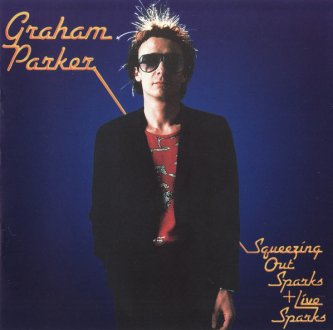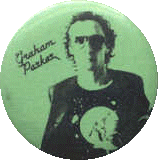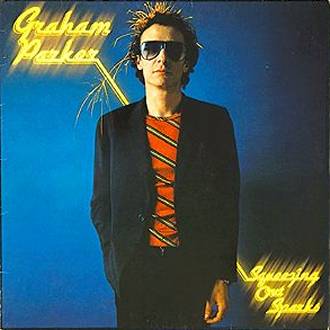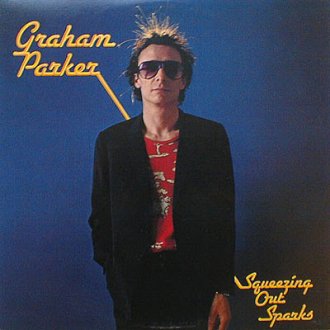



SQUEEZING OUT SPARKS, Vertigo 6360 168, 3/1979, UK, and Arista AL 4223, 3/1979, USA


SQUEEZING OUT SPARKS + LIVE SPARKS, Arista CD 07822-18939-2, 10/1/1996, USA
|
Squeezing Out Sparks 1. Discovering Japan 3:32 2. Local Girls 3:44 3. Nobody Hurts You 3:42 4. You Can't Be Too Strong 3:21 5. Passion Is No Ordinary Word 4:26 6. Saturday Nite Is Dead 3:18 7. Love Gets You Twisted 3:02 8. Protection 3:54 9. Waiting For The UFO's 3:08 10. Don't Get Excited 3:04 P 1979 Arista Records, Inc. |
Live Sparks* 11. Discovering Japan 3:36 12. Local Girls 3:41 13. Nobody Hurts You 3:51 14. You Can't Be Too Strong 3:45 15. Passion Is No Ordinary Word 4:27 16. Saturday Nite Is Dead 3:27 17. Love Gets You Twisted 3:08 18. Protection 4:14 19. Waiting For The UFO's 3:27 20. Don't Get Excited 3:40 21. I Want You Back (Alive) 3:16 22. Mercury Poisoning 3:09 P 1979 Arista Records, Inc. *This entire program is previously unreleased. "Live Sparks" was distributed in 1979 as a promotional LP. |
I sat on a stool in the foreboding, padded confines of a rehearsal room in a new complex in north London, acoustic guitar on lap, rivulets of adrenalized saliva drying in my callused throat, my quivering hands peeling through the pages of a nasty Woolworth's writing pad, searching amongst the smudges, scribbled false starts and red herrings for a batch of new songs that would later become known collectively as Squeezing Out Sparks. The five members of the Rumour, in various states of hangover, artificial stimulation or boredom - depending on which member you looked at - moped, twitched and slumped around, disconcertingly pulling up metal chairs in close proximity to my anxious self, their minds, as usual, already made-up that what they were about to hear would in no way be good enough for their finely honed musical superiority, and that a lot of work was going to be needed to pull this nonsense out of the reject bin, yes indeed. A song called 'Saturday Nite is Dead' yelled out of the pad at me, its very title suddenly appearing hopelessly inane, pointless and phony - but I had to start somewhere. At the end of the performance which elicited a flurry of head-scratching, "What-the-hell-was-that-all-about?" looks of confusion as well as some audible yawns, I dove back into my paperwork, embarrassed, hoping they weren't all as utterly silly as that one. A twisted little effort, stupidly called 'Protection,' popped up next and I launched into it, hoping to quickly draw the band away from the stench of failure the last song had kicked up. Not much better, really. The drummer, in fact, blatantly snorted and said, his chin resting on the back of his hand in a gesture of complete boredom: "Sounds like Jake Thackery!" which drew a few nervous chuckles from everyone else. Jake Thackery was an effete, parodic English gentleman type who appeared on kids shows in the UK, singing vaguely topical songs in a voice that suggested a childhood cleft-palate or lifelong adenoidal problems. This went on for an excruciating hour with scant encouragement but as always, any glimmer of hope I saw in a foot-tap here or a wry smile there, I would grasp like a rope thrown to a drowning man and take heart from, convincing myself that OK, maybe I did burn out after my first two albums, but this stuff wasn't that bad and the Rumour would, with their impenetrable, balls-to-the-wall arrangements disguise the pointlessness, the silliness and the sheer desperation of these, my latest batch of songs.
Enter Jack Nitzsche, a couple of weeks later, gnome-like under a hooded sweat shirt, disgruntled at being torn away from an interesting tryst in Los Angeles and utterly mystified as to who I was, what we were, why he was here in miserable London to produce us, and what was this 'punk' thing anyway? The man who played tambourine on 'Satisfaction' and had worked with Phil Spector arranging many masterpieces of pop, sat at the control board in Lansdowne Studios (a dark basement in Bayswater, built like a World War Two bunker and the usual haunt of British middle-of-the-road acts like Acker Bilk and Des O'Connor) and grimaced under his hood as the Rumour butchered their way through my songs which by now everyone - myself included - were convinced were giant pieces of utter crap.
Behind his bottle-thick specs, Jack would glaze over, mutter the occasional monosyllable and continue fiddling with the strings of his sweater hood, unable to pull himself out of the profound lassitude that the lack of L.A. girlfriend, correct narcotic (whatever it was he wanted, we hadn't heard of it and could not obtain any for him), and total dullness of wit that the awful music produced in him. Two days went by and nothing satisfactory stuck to that multi-track until eventually, I got a little pissed off.
"The band are terrible," he confided on the evening of the second wasted day, after I had pushed him for some answers on how to salvage what was fast becoming a genuine fiasco. "They're not serious about playing your songs; the drummer's using the cymbals too much - that's exciting live, but... and there's so much ego in this band..." "Ego?" I queried. "But Jack, you've worked with the Stones...""There's no ego in the Stones," he stated flatly, "they just play the music.""Christ," I muttered, a nasty realization landing smack on my head. "Anyway man," I continued, "I've gotta make an album here.""What do you want me to do?" he asked, genuinely mystified."Produce us for Christsakes - you're the PRODUCER! TELL THEM WHAT TO DO! I know they all overplay the whole time, I've had three albums of it! Tell us what to do!" I implored, trying to kickstart the man's dead brain cells.
The next morning Jack began calling the shots. He got me to sit down and play a song on guitar and then asked the band why they weren't doing what I was doing; why were they all playing in different directions at once instead of following the songs natural movements? "Are you serious about these songs?" he asked them, and then began, in very few words, to push everyone into a more simplified form of musicianship: basically, we all, for the next nine days, checked our egos at the door and stuff started coming out of those tatty, giant monitor speakers that even had Jack's eyes bulging out to the glass of his spectacles.
When 'Discovering Japan' was finally captured (a difficult song due to the weird push-pull of the verses' rhythm) even one of the guitarists (I know which one) stopped "tut tutting" at what he believed to be the tunes' utter silliness, and just stood there, staring at the speakers, dumbfounded by its awesome, weird beauty.
'Can't Be Too Strong' was one I didn't take seriously, having composed it after a Wreckless Eric gig in Guildford University where I jumped on stage and joined Eric for a drunken version of 'Johnny Be Good.' I wrote the number as an uptempo country ditty and Jack got me to slow it down and stop bluffing, accept the truth, be honest about what I was dealing with instead of - like all of us - trying to disguise everything in a cloak of obfuscating arrangements and pointlessly fast tempos.
In just 11 days, the record was completed and somewhere along the way, on the US tour that followed, 'Live Sparks' was recorded as a radio-only promo disc, but I don't remember a thing about it - it was just another gig.
-Graham Parker
Destinations are great until you arrive at them. Then you have to face messy realities and work out where to go from there. By the fall of '78, three fierce and urgent albums of modern rock 'n' roll distilled and ignited from the genial fumes of pub rock had established Graham Parker as the headmaster of a thrilling new school of British singer/songwriters that quickly came to include Elvis Costello and, a bit later, Joe Jackson. United by ingenuity, intensity and irony, burning with a need to speak their articulate minds, this dissimilar triumvirate got tagged "angry young men," a description absolutely accurate only in its designation of gender. What the three adult auteurs represented had more to do with emotional and intellectual force than any punk-like animosity or youthful rebellion.
Parker came first, and as such was the first to find himself at a creative crossroads. Born in Surrey in 1950, the singer/guitarist had been playing in rock and folk bands since his teens. Unable to make a living at it, though, he'd held such mundane day jobs as gas station attendant and mice-breeder. In 1975, a classified ad Parker placed in Melody Maker initiated a chain of network connections that ultimately assembled the Rumour, a superlative backing band of pub vets containing guitarist Brinsley Schwarz and keyboardist Bob Andrews (both ex-Brinsley Schwarz, which included Nick Lowe), guitarist Martin Belmont (formerly of Ducks Deluxe) and the ex-Bontemps Roulee rhythm section of Andrew Bodnar and Steve Goulding, who now drums in both the Mekons and Poi Dog Pondering. Thus bolstered, Parker's sharp tongue and raspy voice arrived on vinyl in the spring of 1976 with Howlin Wind, followed that October by the equally blistering Heat Treatment. The slight-framed firebrand was off and running, navigating uncharted terrain with typically feisty confidence. But Stick to Me, despite some strong tracks, failed to maintain the momentum, and 1978 brought deeper signs of trouble. Anxious to get out of his contract with Mercury Records, Parker delivered a three-sided concert album, The Parkerilla, dumped off a parting gift (the bitterly accusatory "Mercury Poisoning") and then set about making a long player for his new label, Arista.
For all his well-earned critical favor up to that point, Parker had not enjoyed anything like it in the sales arena. He'd visited the lower echelons of the British Top 20 a couple of times but that was about all; on record, his scrappy individualism and open-ended lyrics had not incited the same excitement as the band's formidable live performances. In those same two years, Elvis Costello had become a genuine chart power in Britain; more significantly, his first pair of albums had even cracked the US Top 40. Spearheaded by the Ramones, the Sex Pistols and the Clash, punk had exploded in the UK, making all the other music in contention seem weak and insincere by comparison. Patti Smith, a vital new wave forerunner, had scored a bona fide hit single, proof that a decade of insistence on commercial conformity was drawing to a close. Bruce Springsteen, to whom Parker had, with slight justification, initially been compared, had become America's platinum poster boy for soul-flavored singer-songrocking.
Into those dark and threatening seas sailed Graham Parker and the Rumour. With the career clock ticking, their options were clear: sink back towards the unchallenging safety and relative obscurity of pubdom or loft themselves to another creative level and swing for the fences. As Parker told Trouser Press magazine in 1977, "If people expect me to do any one thing, fuck 'em."
In less than a fortnight, with the aid of veteran American producer/arranger Jack Nitzche, Graham Parker and the Rumour reinvented themselves on Squeezing out Sparks. Breaking through the guard rails of R & B and elemental rock 'n' roll that had previously outlined their path, they drafted a useful new set of blueprints on the fly. With "Saturday Nite Is Dead" and "Local Girls" drawing a baseline for what had gone before, they splayed out Parker's greatly improved songwriting with taut economy and exhilarating determination.
The seething acoustic balladry of "You Can't Be Too Strong" (from whence came the album's title) forced immediate reconsideration of Parker, both as an artist and as a conformity-defying iconoclast. Whether he intended the lyrics to be an indictment of abortion or just a brutally frank observation of the personal issues at stake, this memorably scathing indictment of parental insensitivity exposed Parker to outraged criticism that he had chosen the wrong side of the looking glass. "It's just a mistake I won't have to face / Don't give it a name, don't give it a place / Don't give it a chance, it's lucky in a way."
With that harrowing song at its center, Squeezing Out Sparks circles around warily, making it clear that Parker's concerns are personal, not political. Urged along by a brisk twin-guitar lick, "Passion Is No Ordinary Word" doubts the honesty and outcome of sexual conquest. In Parker's view, everybody's faking it, and the payoff he sees is richly ironic. "Everything's a thrill / And every girl's a kill / And then it gets unreal / And then you don't feel anything." But as suspicious as he may be of others, Parker can't escape the truth that home is wherever you hang your head. Over a naggingly insistent riff in "Nobody Hurts You," he announces that "Nobody hurts you...harder than yourself." The stately procession of "Love Gets You Twisted" is only marginally warmer in outlook. If "Protection" faces a panoply of internal and external fears, Parker finally concludes there's no safe refuge in the communication age. "Turn off all the information," he orders. Rigging an uncommon-sounding contraption of electric and acoustic guitars over a tricky mock-disco beat, "Waiting for the UFO's" looks skyward, as Parker aims his skepticism at those who would deny the existence of extraterrestrials. Again, the exact nature of Parker's motives remains ambiguous, although subsequent evidence has indicated that he keeps an open mind about weird science.
Upon its appearance in March 1979, Squeezing Out Sparks was hailed for its brilliance and rough-edged sophistication. It reached No. 40 in the Billboard album chart (No. 18 in the UK) and went on to sell more than a quarter-million copies in the U.S., the commercial high-water mark of Parker's catalogue, which now numbers fifteen albums excluding compilations. A month after Squeezing Out Sparks was released, Parker and the Rumour undertook an American tour in support of it. Two of the shows--in San Francisco on April 9 and Chicago on April 28--were recorded and broadcast by local radio stations. Arista culled them to produce the promo-only Live Sparks, a bristling concert album containing all ten songs from the studio record in correct sequence. With Parker and the band sticking near their original arrangements except for the bonus lead stingers on "Protection" and the climactic rave-up that enlivens "Don't Get Excited," the album's only major structural modification was the addition of live versions of the Jackson 5's "I Want You Back" and Parker's own "Mercury Poisoning" that appeared as the final tracks on the two vinyl sides. Manufactured in limited quantities and circulated only to press and radio at the time, Live Sparks was never commercially released and promptly became an eagerly sought and pricey collector's item for fans. Paired here with Squeezing Out Sparks, it provides two prismatic views of Graham Parker and the Rumour pourin' it all into the transition from raw intuition to artful maturity.
Ira Robbins
New York City
August 1996
Back to GP album discography